- Home
- Patricia Briggs
Smoke Bitten: Mercy Thompson: Book 12 Page 21
Smoke Bitten: Mercy Thompson: Book 12 Read online
Page 21
This was a monster.
His skin was red and mottled with oversized veins standing out like tree roots on the forest floor. The only hair or fur on his body was a strip that started at the back of his neck and ended at the top of his hips. Even his pinned, oversized ears and his tail were bare.
His hulking shoulders bulged unnaturally and supported disproportionately long arms ending in clawed hands so massive that they made the big Ruger Redhawk look like a child’s toy from a bygone era. I had no idea how he’d managed to open the gun safe with those hands.
His torso gave a nod to a humanoid shape in that it was upright, but it was too long and bent too much, as if weighed down by those shoulders. His hips and legs were shaped more like a wolf’s and ended in paws that were two or three times the size of his own wolf’s.
The claws on his toes scored the concrete floor. By those marks, I could track him backward to the pile of clothes, which looked as though something had exploded in them. They weren’t ripped—they were confettied—including the heavy leather combat-type boots.
He had, I noted, taken a direct path straight to the gun safe.
His face was a nightmare version of a werewolf’s face, like something dreamed up by a comic book illustrator who was more worried about making something look scary than how viable what he drew was.
Adam’s massive lower jaw was undershot and more like a bulldog’s than a wolf’s, but it was wider than the upper jaw, too. The whole muzzle was too long for the width of his face.
Werewolves have lots and lots of big sharp teeth—but Adam’s teeth now would have done credit to a T. rex. They were black and looked as though you could drop a piece of paper on one and end up with two pieces. I could see most of his teeth because his lips were pulled back in a snarl.
But the most disturbing thing was his eyes. They were entirely human, entirely Adam’s eyes, trapped within the monster. And that was just wrong, because when a werewolf takes his wolf form, the first thing to change is his eyes.
Ugly. He was ugly.
I stood frozen, my hand on the light switch.
He ducked and twisted his head impossibly and let out a sound that was part scream and part wail, impossibly high-pitched with a bass rumble that followed behind and sent my hindbrain into fits. He took an aggressive step toward me and then two slow steps backward.
“After,” he said—and his voice was oddly clear, emerging from that mouth. Werewolves couldn’t talk in their wolf form. Like the eyes, his ability to speak just made this form more wrong. “Go to Bran. Follow his advice.”
And my stunned brain remembered why I’d been so worried about Adam having a gun.
I had a bare moment to figure out what to do. He was a soldier. That gun was going to go off and he would be dead. No hesitation, no fumble.
Worse than useless to wish that I’d been clearer when I told Bran that Adam and I were having troubles. Hard to get good advice from him when he didn’t have all the information.
Blow up the mating bond, Bran had said. Without those words, and if I hadn’t just inspected our bond, maybe I’d have tried something different. Maybe if there had been time to actually think about what to do, I’d have formed a clever plan. But all I had were my instincts. I needed time.
I stepped back into the otherness, where such a thing might be possible. Ever since this place had proven to be useful when I was lost in Europe, I’d been practicing. It was sort of like lucid dreaming, in that I could influence, both on purpose and by accident, what I found there—though that was not to say that I was in control. In this instance, needing time, I imagined a pocket of existence where time moved while no time passed in the real world.
As soon as I entered, I knew that I’d only been partially successful. This gift of time was not infinite. Adam’s gun was still moving and I had only bought myself a little grace to do something about it.
I could see our bond, still frozen, though this time I could see that there were deep fractures in the structure, awaiting just one hard hit to shatter into nothingness. It made me reluctant to move for fear I would shatter it. Bran had not said “shatter” or “cut,” either, for that matter. He had told me to blow it up.
I just needed a bomb.
I’d been reading a lot of fairy tales since I’d put the pack in the place of peacekeeper of the Tri-Cities. Fairy tales weren’t factual, for the most part. But there was a surprising amount of information to be gleaned from them.
Since our Underhill escapee had started killing people, I’d read and reread a few more. The last fairy tale I’d read was the Perrault story “Diamonds and Toads,” where a girl is kind to an old woman at a well, and as a consequence, beautiful and valuable items spilled from her mouth every time she talked.
In the otherness, as in dreams, what I perceived was influenced with apparent randomness by the things that I’d been doing or thinking about.
Blow up the bond.
I opened my mouth and took out the golf-ball-sized pearl that emerged. It wasn’t exactly a bomb, for all that it was round. How was I going to blow up our bond with it? The pearl was luminous, the color a reminder that white was not colorlessness—in being white, the pearl reflected all colors. It struck me as something hopeful, that pearl.
Words are powerful things.
I don’t know where that thought came from. Maybe something I’d read, or something someone had told me. Maybe it was just a universal truth that came to me in that moment.
I brought the pearl up to my mouth and spoke to it. Then I took it and smashed it against the icy bond that stretched from my waist into the dark mist surrounding the little clearing I stood in. When the pearl hit, the bond cracked around it like the safety glass on my Jetta. I shoved the pearl inside and folded the cracked sheet of glass back around the hole. I wrapped my hands over where I’d damaged the bond, and it re-formed beneath my skin, becoming first smooth and then so cold I had to jerk my hands away.
What did you say?
I looked over and saw that a wolf whose gray coat, lighter on his back and darker on his face and feet, shimmered in the odd sourceless light of the otherness. He was curled up in the hollow of a tree growing on the edge of the mist. His tail wrapped around his body and draped over the top of his nose.
He was too small, too thin, and I’d never seen him hide from anything—but I knew him for Adam’s wolf.
“What are you doing here?” I asked him. This was my otherness and I had not summoned him—or Adam—here.
I’ve been driven out by the monster, he said, closing his eyes and starting to fade from my sight.
“Wolf!” I said, desperate to keep him with me. I was deathly afraid that when he disappeared, I would never see him again.
Do you have a question for me? he asked.
I opened my mouth to ask him something, anything to keep him here with me. And the words that came out of my mouth were: “What did the witch do?”
Ah, he said, lifting up his head. That is a good question.
Between us, separating us, a stage the size of a Manhattan apartment kitchen table rose until it was waist high. Mist from the edges of the clearing drifted to the top of the table and solidified until the witch Elizaveta and Adam stood facing each other upon the stage, both naked.
From this perspective I was struck by how perfect they both were. Her body was tall and strong with beautiful pale skin that looked very like the pearl I’d held in my hands. Her hair was long and dark. She looked like some artist’s rendition of an idealized female. And Adam … was Adam.
I’d seen this scene before but not from this observation point. Standing with the mists playing about their feet, they looked like something out of a Russian fairy tale—as if they belonged together.
Do not, warned the wolf harshly. Such thoughts have power here. We cannot afford to feed her magic with your foolish insecurities.
Right. I cleared my mind and tried to pay attention without judgment. There was something here that I need
ed to know.
The first time I’d seen this, I’d been in a position to watch Adam’s face. This time I could see Elizaveta’s as she stepped into his space, leaning her tall, naked body against his. She tilted her head and bent forward to kiss him.
Her lips touched his—and even though I knew what had happened and why, fierce possessiveness swept through me.
He was mine. She had no right to touch him.
Yes, said the wolf. We were yours.
Are mine, I thought fiercely. Are.
I didn’t say the words aloud, and I couldn’t tell if he’d heard me.
One of Adam’s arms wrapped around her waist, holding her to him, his hand flat against the small of her back.
He liked to hold me like that, protective and possessive.
His other hand cupped her face, then threaded through her long silky hair on its fatal journey to the back of her head.
As his fingers tightened, her eyes, which had been closed to savor his kiss, flashed open and comprehension slid across her face. In that second, when she knew she was going to die, magic slid from her mouth and into his.
Her magic carried her voice, her words, into him. You are the monster you think yourself to be.
He broke her neck, stepping away from her, allowing her body to fall away. But he put distance between them too late. Her death-gift sank into him, disappearing beneath his skin as he looked up and fell into parade rest.
Waiting, I remembered, for my judgment. I reached out for him and the scene faded away. My fingers brushed the stage and it altered under my touch, becoming the stump of a tree that some giant saw had cut more or less flat. The wood bit my finger and a drop of blood welled and landed on the stump.
This was my otherness, formed of things I knew. My stomach tight, I looked at the wolf and asked, “Was that something I saw, but didn’ t—” That night had been one horror after another, I’d been so tired by that point. “—didn’t pay attention to?”
It is what was, the wolf said, seeming a little less substantial than he had before.
He said, He was lost in that moment, for he believed the truth of her words before she gave them to him. His voice faded, growing softer. Twice born those words, his and then hers. So they took hold in his belief and made it true.
I walked around the tree stump and knelt beside him. He was smaller now, the size of a German shepherd maybe.
“What’s happening to you?” I asked.
He is becoming, answered the wolf tiredly. I am unmaking.
I pulled another gemstone out of my mouth. This one was an amethyst about the size of a marble, uncut and rough-sided. I took it and spoke to it, too. When I was finished, I held it out to the wolf, who eyed it.
What do you have for me? he asked.
“It won’t work if I tell you,” I said, following my instincts. “Eat it.”
He opened his mouth and consumed the purple stone. I waited, but there seemed to be no effect for good or ill. Maybe it would take time—real time, not otherness time.
He was no bigger. He didn’t move his body, had not moved anything but his head the whole time we’d been here.
But his voice was steady when he asked, What did you do to the bond?
I looked at the bond then. The tie that bound me to Adam was now the same color and texture as the scabby red skin that covered Adam’s monstrous form. I touched it and the skin-like surface was rough under my fingertips. My wounded finger left a thin trail of blood behind that melted into the bond, which did not change again. Blood is one of those things, like words, that have unexpected power. The bond was ugly, but it did not look fragile.
“Well,” I told him, “I didn’t blow it up.” I’d intended the pearl to blow it up until that last second before it touched the bond. I didn’t want to lose Adam, and I wasn’t willing to risk breaking our bond—and the pearl had looked so hopeful.
“But maybe,” I said, “I instilled a little common sense and logic into the situation.”
What words did the pearl hold? he asked.
I took a breath and the otherworld faded to nothing. I was back in the auto bay with Adam and a gun that was moving quickly toward his head.
“You are mine,” I told him, using the same words I’d given the pearl. “I can’t stop you from using that gun. But you know what?”
I was so angry at him. As if the whole time I’d been in that otherness, anger had been filling the real me from the bottom of my feet to the top of my head and it was spilling out my mouth—as that pearl had done.
“It doesn’t matter if you live or die—you are still mine,” I bit out. “Alpha werewolf, nightmare creature—I don’t care. But don’t you forget who I am. You gave yourself to me, and now you can’t get away.” I took a step closer to him and jutted out my chin. “You die, and I will drag your butt back from the afterlife kicking and screaming. But let me tell you, mister. If you are dead, you’ll just have to watch us get hurt—without being able to do a damn thing about it. Because you will be dead and helpless and I won’t let you go. And. Every.” I pointed my finger at him, stabbing him with it figuratively the way I was tempted to do it literally. “Single. Day. I will say, ‘I told you that you would regret pulling that trigger, you bastard. I told you so.’”
I was shaking with rage when I finished saying the words I had sent inside our bond with the pearl. How dare he? How dare he try to kill himself?
He’d lowered the gun at some point during my speech. There was an odd expression on his face.
“Bastard,” I said again, though I had intended to stop after I told him the words I’d sealed into that pearl.
But the single word didn’t provide any relief for what I felt. I stomped my foot like a two-year-old. My eyes burned and tears formed … tears of something huge, bigger than grief, bigger than rage, and they burned down my face.
“Go talk to Bran, you said.” I was enraged at the thought. He’d given me words like a pat on the head—something to make him feel as though he weren’t leaving me alone. “Fuck that. You just try to leave me, you bastard, see how far that gets you—” I might have devolved into incoherence after that.
Adam put the gun slowly down on the counter. He tried to uncock it, but his oversized hands equipped with oversized claws apparently weren’t up to that, so he pointed the muzzle away from us both. I realized (and this didn’t lessen my anger one iota) that if I’d listened to him and replaced the gun in the safe with a 1911 instead of the Redhawk, he wouldn’t have been able to even try to kill himself with it because it would have been too small.
The gun safely dealt with (as safely as a loaded and cocked gun could be dealt with, anyway), Adam started walking toward me. He did it slowly, cautiously, as if he were afraid of me.
Or more probably, under the circumstances, because he was worried that his unusual form might scare me—or revolt me as it evidently did him.
Slowly he wrapped those too-long arms around me and hauled me to him, lifting me so my face could press against his neck. I was still yelling at him.
“Shhhh,” he said. “Sorry. You’re right. Of course you’re right.”
“I’ll monster you,” I growled.
“Of course you will,” he soothed. But there was something in his voice.
I was so mad I wouldn’t have been surprised if I gave him steam burns. “Are you laughing at me?”
“Maybe—” he began, and then choked. His arms jerked convulsively.
He set me down on my own feet abruptly. Took a step back and then dropped to the concrete on his hands and knees. He didn’t make any noise as he transformed from monster to human, but it was so fast it must have hurt. Under other circumstances, the popping and crunching sounds of bones doing something that bones aren’t really designed to do might have made me feel sorry for him. Made me worry for him. But I was still too … too something.
He wasn’t dying—anything else he did was his own problem.
I stalked to the gun, uncocked it, and
put it back in the safe. I closed the safe door and stalked back past him and into the bathroom. I shut the door behind me and grabbed a washcloth to wipe my eyes and stopped when I saw myself in the mirror.
Holy cow.
My usually brown skin was blanched until it looked green. The two black eyes that had been oncoming after the accident were definitely bruised, and my nose was swollen with a trickle of blood dried on my upper lip. There was another bruise along the cheek next to the white scar that usually looked sort of like war paint. But now that I looked like an extra from The Walking Dead, it just completed the effect.
“I see your monster,” I muttered, turning on the water. “And raise you another one.” I leaned closer to the mirror. “Brainssss.”
As I held the washcloth under the flow, I tipped my chin to see if I looked better from another angle. Huh. There was a bruise and a friction burn on my neck where the seat belt caught me before it let me go too soon. I pulled back my shirt and … wowza.
I’d been in worse wrecks—and I’d been hurt worse in them. But I didn’t remember looking worse after a collision. No wonder Adam had been on edge. Well, that and apparently Elizaveta had gotten him with a curse as she died.
I didn’t know what to do about that curse. I’d bought us some more time, I thought. Bran might have an idea or two … but I was a little leery of contacting him after Adam’s over-the-top reaction. And Bran was weird about witchcraft. Maybe I’d call Charles; Charles had his own sort of magic.
I put the washcloth against my eyelids—very careful of my nose—and waited for a while. When I pulled the washcloth away, my eyes were still red like I’d been wearing bad contacts for a week, but they felt better. I wiped the blood off my lip.
I was tired of all the emotion. I didn’t want to open the door. I wanted to magically wake up tomorrow with the relationship between Adam and me reset to a normal place. My heart hurt.

 Wolfsbane
Wolfsbane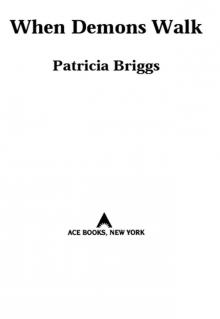 When Demons Walk
When Demons Walk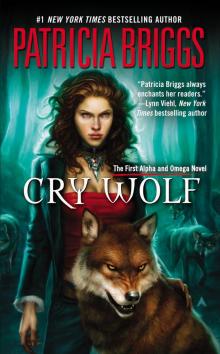 Cry Wolf
Cry Wolf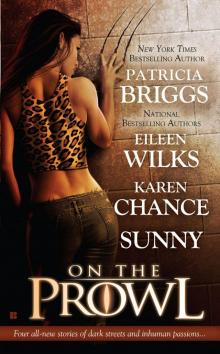 On the Prowl
On the Prowl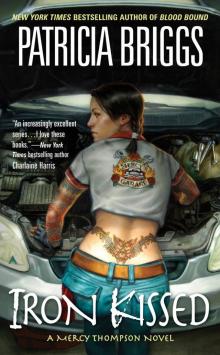 Iron Kissed
Iron Kissed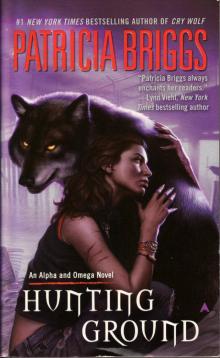 Hunting Ground
Hunting Ground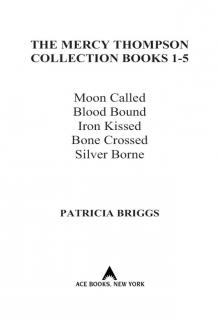 Patricia Briggs Mercy Thompson: Hopcross Jilly
Patricia Briggs Mercy Thompson: Hopcross Jilly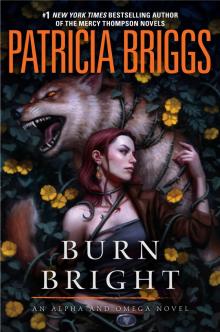 Burn Bright
Burn Bright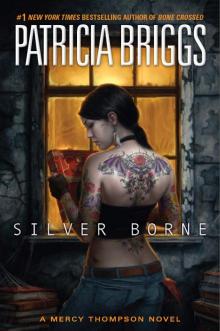 Silver Borne
Silver Borne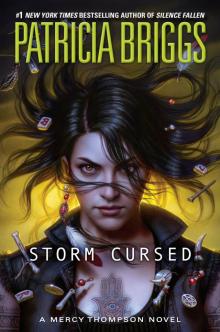 Storm Cursed
Storm Cursed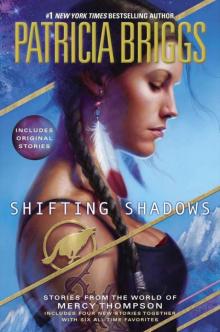 Shifting Shadows
Shifting Shadows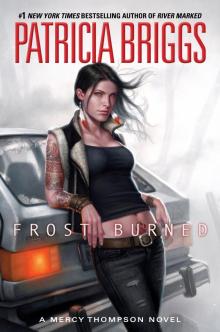 Frost Burned
Frost Burned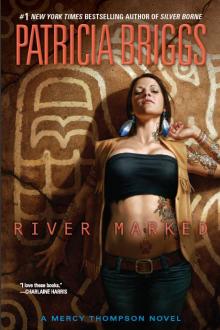 River Marked
River Marked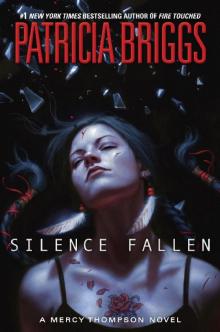 Silence Fallen
Silence Fallen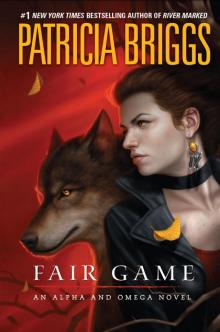 Fair Game
Fair Game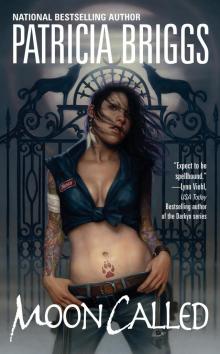 Moon Called
Moon Called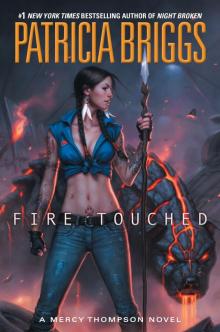 Fire Touched
Fire Touched Dead Heat
Dead Heat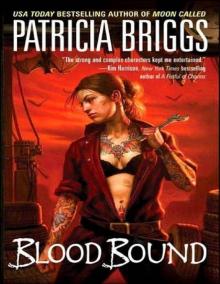 Blood Bound
Blood Bound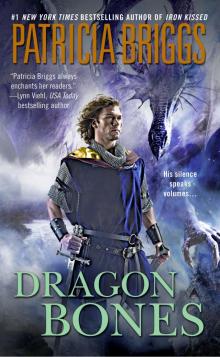 Dragon Bones
Dragon Bones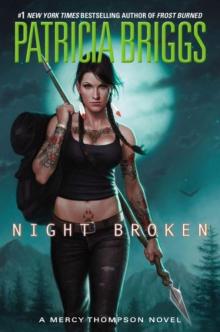 Night Broken
Night Broken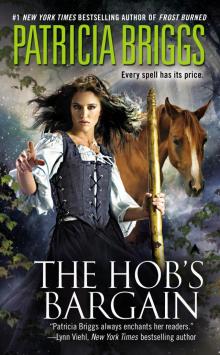 The Hobs Bargain
The Hobs Bargain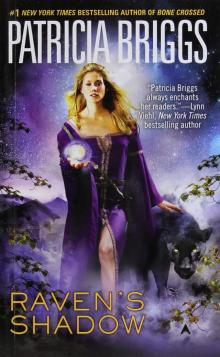 Ravens Shadow
Ravens Shadow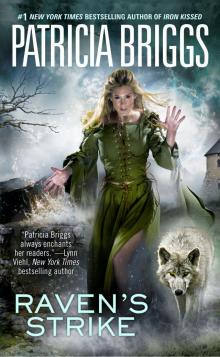 Ravens Strike
Ravens Strike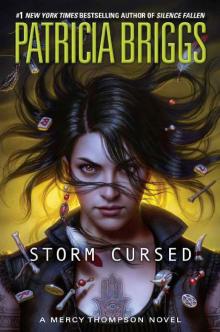 Storm Cursed (A Mercy Thompson Novel)
Storm Cursed (A Mercy Thompson Novel)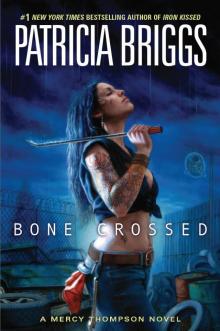 Bone Crossed
Bone Crossed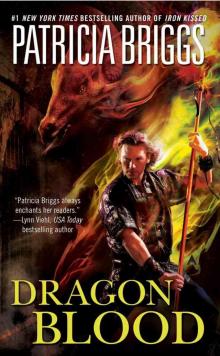 Dragon Blood
Dragon Blood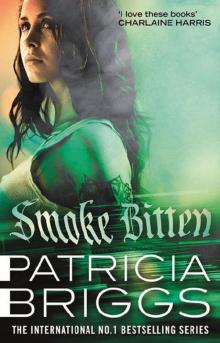 Smoke Bitten: Mercy Thompson: Book 12
Smoke Bitten: Mercy Thompson: Book 12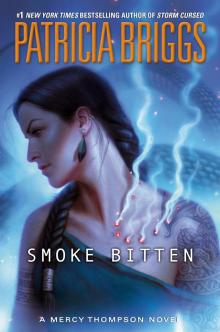 Smoke Bitten
Smoke Bitten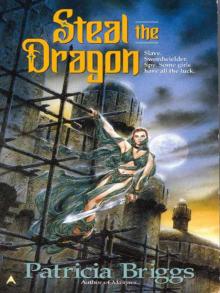 Steal the Dragon
Steal the Dragon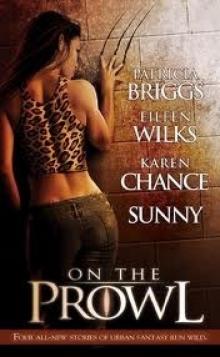 0.5 On The Prowl (alpha and omega)
0.5 On The Prowl (alpha and omega)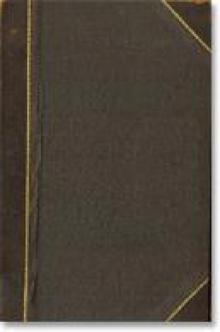 Alpha and Omega
Alpha and Omega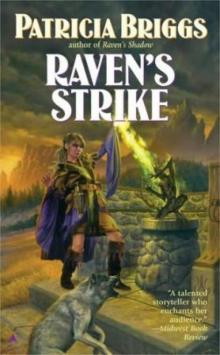 Raven's Strike rd-2
Raven's Strike rd-2![[Mercy 03] - Iron Kissed Read online](http://i1.bookreadfree.com/i/03/24/mercy_03_-_iron_kissed_preview.jpg) [Mercy 03] - Iron Kissed
[Mercy 03] - Iron Kissed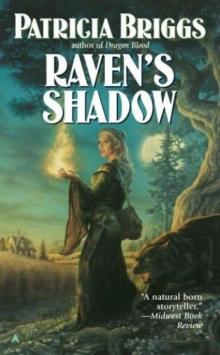 Raven's Shadow rd-1
Raven's Shadow rd-1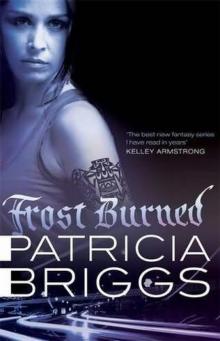 Frost Burned mt-7
Frost Burned mt-7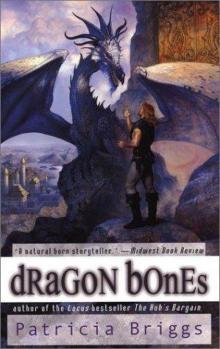 Dragon Bones h-1
Dragon Bones h-1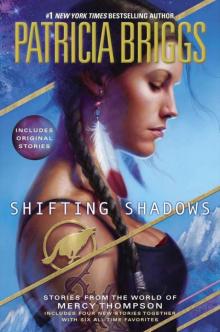 Shifting Shadows: Stories from the World of Mercy Thompson
Shifting Shadows: Stories from the World of Mercy Thompson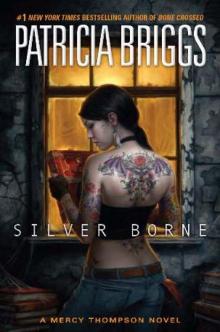 Silver Borne mt-5
Silver Borne mt-5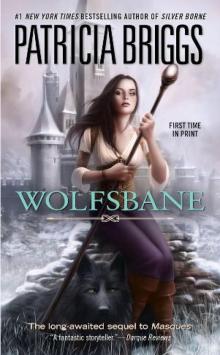 Wolfsbane s-2
Wolfsbane s-2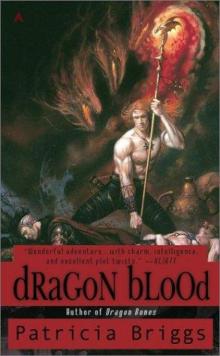 Dragon Blood h-2
Dragon Blood h-2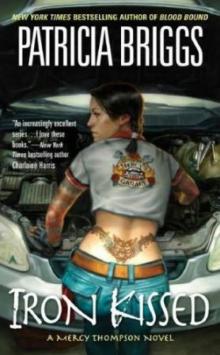 Iron Kissed mt-3
Iron Kissed mt-3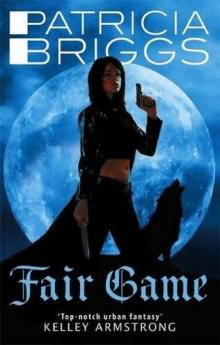 Fair Game aao-3
Fair Game aao-3 Masques s-1
Masques s-1![[Hurog 01] - Dragon Bones Read online](http://i1.bookreadfree.com/i1/04/03/hurog_01_-_dragon_bones_preview.jpg) [Hurog 01] - Dragon Bones
[Hurog 01] - Dragon Bones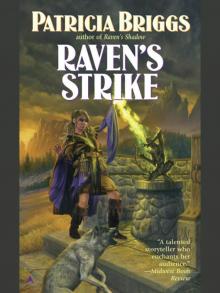 Raven s Strike
Raven s Strike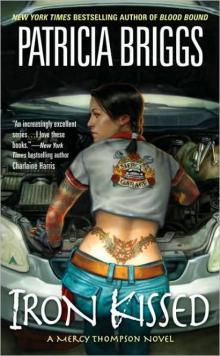 Mercedes Thompson 03: Iron Kissed
Mercedes Thompson 03: Iron Kissed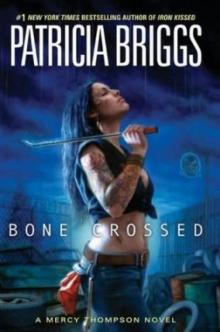 Bone Crossed mt-4
Bone Crossed mt-4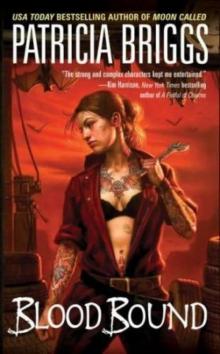 Blood Bound mt-2
Blood Bound mt-2![[Mercy 01] - Moon Called Read online](http://i1.bookreadfree.com/i2/04/09/mercy_01_-_moon_called_preview.jpg) [Mercy 01] - Moon Called
[Mercy 01] - Moon Called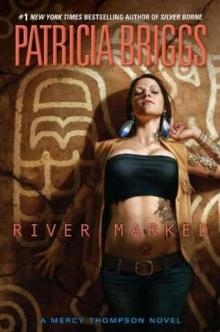 River Marked mt-6
River Marked mt-6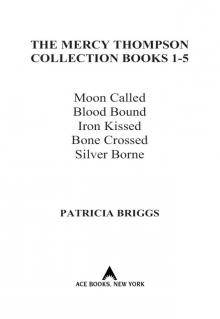 The Mercy Thompson Collection
The Mercy Thompson Collection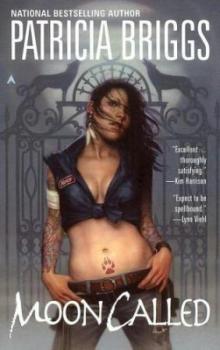 Moon Called mt-1
Moon Called mt-1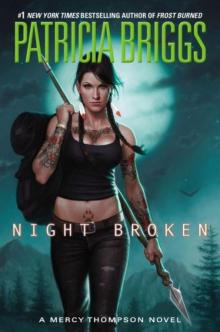 Mercy Thompson 8: Night Broken
Mercy Thompson 8: Night Broken